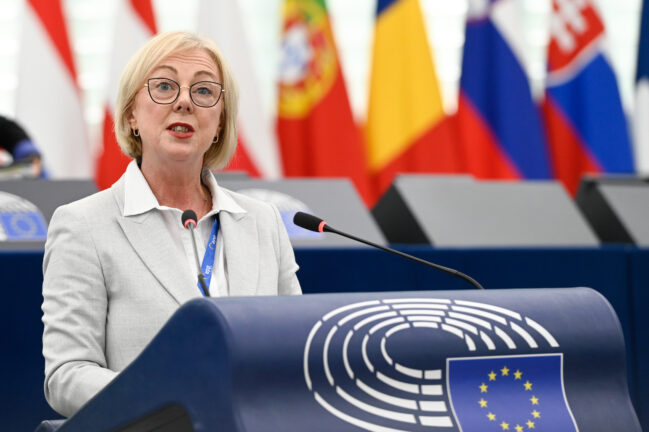How to tax multinational technology companies after the United States withdrew from the OECD’s global tax framework? This was the main theme for the session on “Taxation of large digital platforms in the light of international developments” held in the European parliament on Wednesday, 10 September.
“There is commonly said to be two certainties in life: death and taxes”, MEP Regina Doherty (EPP, IRL) told colleagues in Strasbourg. But for Big Tech, even taxes seem to be up for debate. Lawmakers discussed whether to wait for a multilateral deal or press ahead with unilateral measures—a choice with high political and economic stakes.
Global tax on pause
At the heart of the discussion was the collapse of the OECD Global Tax. The 2021 deal promised a two-pillar solution. Pillar One would reallocate part of Big Tech’s profits to the countries where their consumers are. Pillar Two would impose a 15 per cent minimum corporate tax on groups with turnover above €750m. The EU has already implemented it.
This global deal collapsed in early 2025 when Donald Trump signed an executive order withdrawing America from the agreement. In Strasbourg, MEP Doherty warned that Trump “sees the agreement as an attack on American business” and is even permitting threats of retaliation. For her, “instead of calling for new taxes, we should be looking at ways to better calibrate the ones we already have”. Ms Doherty asked a question to the Commission: If Washington refuses to return, will Brussels stick to the OECD process or go for a unilateral digital services tax?
Commission’s careful respond
Michael McGrath, Commissioner for Democracy, Justice, the Rule of Law and Consumer Protection, was careful not to inflame transatlantic tensions. He noted that the Commission had in 2018 floated both a digital services tax and a framework for “significant digital presence”, but that consensus had proved elusive. “Digitalisation of our economy challenges one of the fundamental principles of traditional tax systems, that profits should follow presence”, he said.
Digitalisation of our economy challenges one of the fundamental principles of traditional tax systems, that profits should follow presence. — Commissioner Michael McGrath
Yet, with Pillar Two now in place and broadly compatible with the U.S. regime, McGrath argued that the priority was to give the OECD time to succeed on Pillar One. “Pillar One means the most substantial change in taxing rights in over a century”, he told MEPs, “and we do not intend to present a new proposal for an EU digital tax at this stage”.
Tax the rich tech
That caution did not satisfy those who see Big Tech as exploiting loopholes to minimise contributions. MEP Bruno Gonçalves (S&D, PRT) accused Silicon Valley companies of underpaying taxes while ordinary European companies shoulder the burden. “All evidence points to workers and small businesses paying higher rates than Meta, Amazon, and other digital giants”, he said. “With the threat of tariffs and other retaliation, this U.S. administration is trying to prevent us from reaching a European solution. The S&D group chose tax justice, and more importantly, we chose democracy,” Mr Gonçalves added.
All evidence points to workers and small businesses paying higher rates than Meta, Amazon and other digital giants. — MEP Bruno Gonçalves (S&D, PRT)
MEP Rasmus Andresen (Greens, DEU) cited the “more than €90bn” profits made recently by Meta, Microsoft and their peers. “So much profit and hardly any taxation, certainly not in Europe”, he argued. “The Commission isn’t doing anything. They are afraid of Trump raising tariffs or not providing security guarantees. They are making billions in profit; it is time we tax them,” Mr Andersen said.
From the left, MEP Jussi Saramo (Left/FIN) made a similar plea, calling Europe’s tax system outdated and accusing Trump of having “thrown tax agreements in the trash bin” years earlier. “It is time to tax Musk, Zuckerberg, and other friends” he said.
You might be interested
No unilateral calls
Others urged prudence. MEP Fernando Navarrete Rojas (EPP/ESP) warned that unilateral digital services taxes would undermine Europe’s credibility. “Resisting the temptation of unilateral actions is not weakness, it is responsibility and leadership”, he told the Parliament. MEP Francesco Torselli (ECR, ITA) also cautioned against repeating mistakes seen in manufacturing and agriculture. “Otherwise, it is a blow to consumers, instead of achieving tax justice”.
On the same point, MEP Doherty pressed for evidence-based policymaking. She urged that any future digital services levy should be preceded by a full cost-benefit analysis, since “there is no way a tax does not impact consumers in some way”.
Resisting the temptation of unilateral actions is not weakness, it is responsibility and leadership. — MEP Fernando Navarrete Rojas (EPP, ESP)
MEP Katri Kulmuni (Renew/FIN) offered a centrist bridge: neither hasty unilateralism nor indefinite patience. “We must defend our digital autonomy,” she said. “Companies have to pay taxes in the place where profits are generated, whether or not they have a physical presence”, pointed out Bulgaria’s MEP Rada Laykova (ESN).
€37.5 billion in taxes
Big Tech companies generate substantial profits in Europe, yet their effective tax rates remain far below those of traditional businesses. According to the European Commission, “digitalised businesses face an effective tax rate of only 9.5%, compared to 23.2% for traditional business models”.
Analysts at the Centre for European Policy Studies, in a study sponsored by the Greens, estimate that a five per cent EU-wide digital services tax could raise around €37.5bn by 2026. That’s the equivalent of nearly 19% of the EU’s 2025 budget.
Europe’s strategy for taxing Big Tech is twofold. Some member states, including France and Spain, have implemented national digital services taxes at 3% targeting digital revenues. The EU is also enacting a global minimum corporate tax of 15% under the OECD Pillar Two framework.
Between patience and pressure
For now, the Commission insists it is not preparing any new proposal, nor conducting an impact assessment. Instead, it expects that discussions on Pillar One could resume later this year.
Commissioner McGrath sought to reassure lawmakers in closing. “The Commission remains a strong supporter of multilateralism. Our goal is to successfully conclude the Pillar One discussion; we are fully committed to making this happen. If global consensus remains out of reach, we will collaborate closely with the Parliament and member states to determine next steps,” Mr McGrath concluded.











